1061 scholarly books by Catholic University of America Press and 47
start with I
1061 scholarly books by Catholic University of America Press and 47
1061 scholarly books by Catholic University of America Press
47 start with I start with I
47 start with I start with I
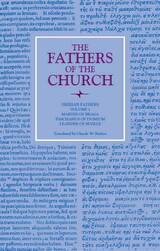
Iberian Fathers, Volume 1
Martin of Braga
Catholic University of America Press, 1969
No description available
[more]
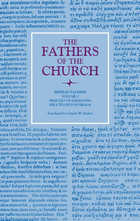
Iberian Fathers, Volume 2
Claude W. Braulio of Saragossa
Catholic University of America Press, 1969
In this second volume of translations from the Iberian Fathers appear the works of two seventh-century writers. From the first of these, bishop Braulio of Saragossa, a figure in Visigothic literature second only to St. Isidore of Seville, comes an extensive collection of letters. These are variously addressed to Isidore himself, to other ecclesiastics, to Pope Honorius, and to King Receswinth; friends and relatives were the recipients of seven letters of consolation. Braulio's letters are joined by the Life of a near contemporary, St. Emilian, and by a valuable list of the writings of Isidore, under whom Braulio studied. Fructuousus of Braga is represented by two monastic rules. The first of these was composed for Compludo, a foundation made by Fructousus himself; the other rule is a general or common one. Two other writings dealing with monastic practice accompany these rules, together with a letter to King Receswinth.
[more]
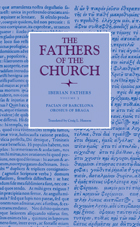
Iberian Fathers, Volume 3
Pacian of Barcelona
Catholic University of America Press, 1999
No description available
[more]
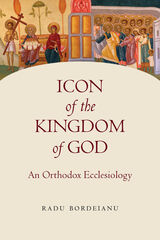
Icon of the Kingdom of God
An Orthodox Ecclesiology
Radu Bordeianu
Catholic University of America Press, 2023
What is the Church? Some would answer this question by studying the Scriptures, the history of the Church, and contemporary theologians, thus addressing the theological nature of the Church. Others would answer based on statistics, interviews, and personal observation, thus focusing on the experience of the Church. These theological and experiential perspectives are in tension, or at times even opposed. Whereas the first might speak about the local church as the diocese gathered in the Liturgy presided over by its bishop, the latter would describe the local church as the parish community celebrating the Liturgy together with the parish priest, never experiencing a sole liturgy that gathers an entire diocese around its bishop. Whereas a theologian might abstractly describe the Church as a reflection of the Trinity, a regular church-member might concretely experience the Church as a community that manifests the Kingdom of God in its outreach ministries. Radu Bordeianu attempts to bring these two perspectives together, starting from the concrete experience of the Church, engaging this experience with the theological tradition of the Church, extracting ecclesiological principles from this combined approach, and then highlighting concrete situations that reflect those standards or proposing correctives, when necessary.
Without pretending to be a complete Orthodox ecclesiology, Icon of the Kingdom of God addresses the most important topics related to the Church. It progresses according to one’s experience of the Church from baptism, to the family, parish, Liturgy, and priesthood, followed by analyses of synodality and nationality. Arguing that the Church is an icon of the Kingdom of God, this volume brings together the past theological heritage and the present experience of the Church while having three methodological characteristics: experiential, Kingdom-centered, and ecumenical.
[more]
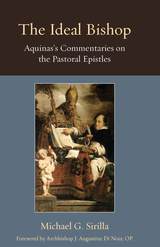
The Ideal Bishop
Michael G. Sirilla
Catholic University of America Press, 2017
St. Thomas Aquinas’s commentaries on the Pastoral Epistles are distinctive and overlooked theological resources, offering invaluable insights into the exercise of the episcopal office in bringing about the spiritual perfection of the faithful in Christ. The Ideal Bishop includes a review of the theology of the episcopacy found in St. Thomas’s principal contemporaries, including Peter Lombard, St. Albert the Great, and St. Bonaventure of Bagnoregio. The heart of this book is an examination of the theology and spirituality of the episcopacy found in the lectures on 1 Timothy, 2 Timothy, and Titus. Particular attention is devoted to Aquinas’s treatment of the nature, purpose, requisite virtues, disqualifying vice, special duties, and particular graces of the episcopal office.
[more]
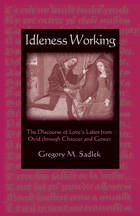
Idleness Working
the Discourse of Love's Labor from Ovid through Chaucer and Gower
Gregory M. Sadlek
Catholic University of America Press, 2004
Inspired by the critical theories of M. M. Bakhtin, Idleness Working is a groundbreaking study of key works in the Western literature of love from Classical Rome to the late Middle Ages.
[more]
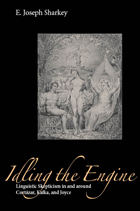
Idling the Engine
Linguistic sSkepticism in and around Cortázar, Kafka, and Joyce
E. Joseph Sharkey
Catholic University of America Press, 2006
Author E. Joseph Sharkey uses the philosophies of language of Hans-Georg Gadamer and Ludwig Wittgenstein to counter the skepticism in question by showing that a language grounded in history instead of the transcendent is grounded nevertheless.
[more]
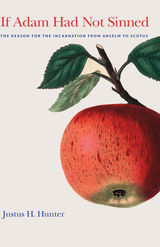
If Adam Had Not Sinned
The Reason for the Incarnation from Anselm to Scotus
Justus H. Hunter
Catholic University of America Press, 2020
Since the twelfth century, theologians have found a counterfactual question irresistible: “If Adam had not sinned, would the Son have become incarnate?” In the latter half of the twentieth century, Hans Urs von Balthasar, Hans Küng, Gerhard Ludwig Müller, Karl Rahner, Karl Barth, Wolfhart Pannenburg, Jürgen Moltmann, and Robert Jenson all considered this question on the reason, or motive, for the incarnation. Nearly every case refers to the classic disagreement between those who follow Thomas Aquinas and those who follow John Duns Scotus.
Though it is common to claim Thomas or Scotus as one’s authority, the theological debates among which Thomas and Scotus developed their own positions remain largely neglected. This study fills that gap. If Adam Had Not Sinned is a study of the medieval debates over the motive for the incarnation from Anselm of Canterbury to John Duns Scotus. While the volume is primarily focused on thirteenth-century debates at the University of Paris, it also supplies necessary historical background to those debates. As a result, the larger context within which Thomas Aquinas and John Duns Scotus developed their influential responses is detailed. This larger context permits an analysis that leads to the surprising claim, against widespread assumptions, that the responses given by Thomas and Scotus are substantially reconcilable.
[more]

Ignatius of Loyola and Thomas Aquinas
A Jesuit Ressourcement
Justin M. Anderson
Catholic University of America Press, 2023
Though the relationship between Jesuits and Dominicans has historically been marked by theological controversy, Ignatius of Loyola, the founder of the Jesuits, shows remarkable affinity for the Thomistic tradition, the tradition advanced above all by the Dominican order. When writing the Jesuit Constitutions, in fact, Ignatius made Thomas Aquinas’s Summa Theologiae the primary textbook for Jesuit theological formation. The contributions to this volume—originating from Jesuits, Dominicans, and lay scholars alike—explore different aspects of the complex yet illuminating relationship between Ignatius and Thomas. The themes range from the general relationship between the early Jesuits and scholastic theology to the attempts by Francisco de Toledo, the first Jesuit cardinal, to apply Thomistic reasoning to the religious and legal status of Jewish converts to Christianity. Other contributions compare Ignatius and Thomas on topics of significant interest for dogmatic, sacramental, and spiritual theology: spiritual experience, the ordering of the passions, the use of the imagination, prudence and discernment of spirits, frequent communion, Mariology, the “hierarchical church,” and the limits of obedience.
Students of Ignatius of Loyola, Thomas Aquinas, second scholasticism, Christian-Jewish relations, and spiritual theology in general will find this volume an invaluable contribution.
[more]
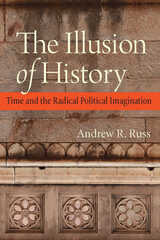
The Illusion of History
Andrew R. Russ
Catholic University of America Press, 2012
Andrew Russ argues in this book that a closer look at their philosophical underpinnings finds that Rousseau, Marx, and Foucault are much less "historical" in their methodology than is widely believed. Instead, they share a more "timeless" view, one indebted to principles ordinarily seen as timeless or transcendent
[more]
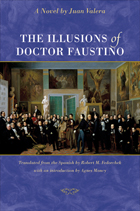
The Illusions of Doctor Faustino
Juan Valera
Catholic University of America Press, 2008
Translated from the Spanish by Robert M. Fedorchek with an introduction by Agnes Moncy
[more]
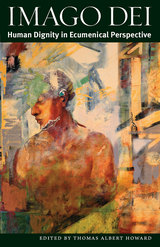
Imago Dei
Thomas Albert Howard
Catholic University of America Press, 2013
Imago Dei will serve as an indispensable resource for those wishing to deepen their grasp of the theological bases for Christian views of human dignity, as well as for those who believe that Christ's words "that they be one" (John 17:21) remain a theological imperative today
[more]
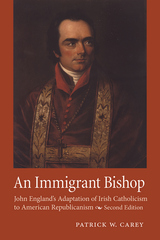
An Immigrant Bishop
John England's Adaptation of Irish Catholicism to American Republicanism, Second Edition
Patrick W. Carey
Catholic University of America Press, 2022
An Immigrant Bishop is a revised examination of the Irish intellectual roots of Bishop John England’s American pastoral works in the diocese of Charleston, South Carolina (1820-1842). The text focuses on his political philosophy and his theology of the Church, both of which were influenced by the Enlightenment and a theological, not a political, Gallicanism. As the study demonstrates, we now know more about England’s intellectual life prior to his immigration than we do about any other Catholic immigrant from Ireland. Neither Peter Guilday’s monumental two-volume biography (1927) of England nor any subsequent scholarly study of England has uncovered and analyzed, as this book does, England’s many unpublished and published writings in Ireland—his explicitly authored texts, his published speeches before the Cork Aggregate meetings, and his pseudonymous articles in the Cork Mercantile Chronicle between 1808, when he was ordained, and 1820, when he emigrated to the United States.
John England (1786-1842), the first Catholic bishop of Charleston, was the foremost national spokesman for Catholicism in the United States during the years of his episcopacy and the primary apologist for the compatibility of Catholicism and American republicanism. He was also the first Catholic bishop to speak before the United States Congress and the first American to receive a papal appointment as an Apostolic Delegate to a foreign country (in this case to negotiate a concordat with President Jean Pierre Boyer of Haiti). He is considered the father of the Baltimore Provincial Councils and the nineteenth-century American Catholic conciliar tradition. He was also the only bishop in American history to develop a constitutional form of diocesan government and administration. Among other things he was the first cleric to establish a diocesan newspaper that had something of a national distribution. England’s contribution to the early formation of an American Catholicism has been told many times before, but he has the kind of creative mind and episcopal leadership that demands repeated re-considerations.
[more]
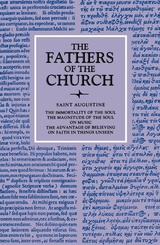
The Immortality of the Soul; The Magnitude of the Soul; On Music; The Advantage of Believing; On Faith in Things Unseen
Saint Augustine
Catholic University of America Press, 1947
No description available
[more]
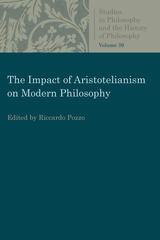
The Impact of Aristotelianism on Modern Philosophy
Riccardo Pozzo
Catholic University of America Press, 2019
This volume provides the first extensive assessment of the impact of Aristotelianism on the history of philosophy from the Renaissance to the end of the twentieth century. The contributors have considered Aristotelian issues in late scholastic, Renaissance, and early modern philosophers such as Vernia, Nifo, Barbaro, Cajetan, Piccolomini, Patrizzi, Zabarella, Campanella, Galileo, Sémery, Leibniz, Rousseau, Kant, Hegel, Nietzsche, Husserl, Heidegger, Wittgenstein, and Gadamer. Specific attention is given to the role of the five intellectual virtues set forth by Aristotle in book VI of the Nicomachean Ethics, namely art, prudence, science, wisdom, and intellect.
[more]
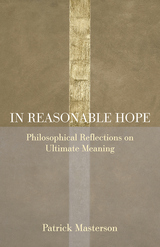
In Reasonable Hope
Philosophical Reflections on Ultimate Meaning
Patrick Masterson
Catholic University of America Press, 2021
In Reasonable Hope considers three foundational responses to this quest for some understanding of the existence, meaning, and value of everything. Other approaches can be considered as combinations or variations of these. Firstly, there is the approach which claims that it is our humanity, exercising its unique intelligent subjectivity, that is the source and measure of all possible meaning and value. Nothing can be thought of as existing, meaningful or of value apart from a thinking human subject. This is a broadly Humanist approach to ultimate meaning. Man is the measure of all things. Secondly, there is the approach of Scientism. This claims that an ultimate understanding of the world and ourselves must be sought, less anthropocentrically, in terms of the findings of basic empirical sciences such as physics and chemistry. We live in a world ever-increasingly dominated by the autonomous system of science and technology. Such Scientism implies an explicitly reductionist and materialist conception of the meaning and value of everything. Thirdly, there is the approach of Theism which maintains that, in the final analysis, the meaning and value of everything, insofar as this can be known, is to be explained in terms of a transcendent infinitely perfect personal being we call God.
The first two approaches are carefully considered. However, it is the third to which most attention is devoted. Consideration is given to the traditional impersonal metaphysical approach to questions about the existence and nature of God. The alternative approaches of linguistic philosophy and phenomenology, which reject such metaphysical speculation are also discussed. These various approaches are judged to be complementary rather than strict alternatives.
In the latter half of the book is devoted to a more personal and self-involving discussion of the relevance of an affirmation of the existence of God. It explores the implications of a rational commitment to live one's life in accordance with the requirements of values which transcend explanation in purely physical terms, such as truth, goodness, beauty, and especially love. It provides a personal and existential development of the rational hope that such values are ultimately more objectively real and dependable than the eventual universal material chaos predicted by empirical science. It argues that the existence of God as the infinite expression and source of these values is the necessary and sufficient condition of this rational hope in their enduring significance. Finally, there is an account of how the Christian Revelation illuminates and transforms our rational hope in the enduring significance of love of God and neighbor.
[more]
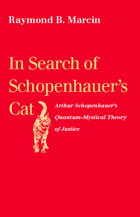
In Search of Schopenhauer's Cat
Arthur Schopenhauer's Quantum-Mystical Theory of Justice
Raymond B. Marcin
Catholic University of America Press, 2006
In this book Raymond B. Marcin offers several reasons why a review and a reevaluation of Schopenhauer's theory of justice are worthwhile now, almost two hundred years after it was first formulated.
[more]
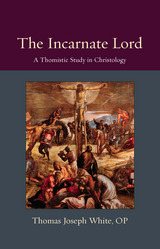
The Incarnate Lord
Thomas Josepth White, OP
Catholic University of America Press, 2015
The Incarnate Lord, then, considers central themes in Christology from a metaphysical perspective. Particular attention is given to the hypostatic union, the two natures of Christ, the knowledge and obedience of Jesus, the passion and death of Christ, his descent into hell, and resurrection. A central concern of the book is to argue for the perennial importance of ontological principles of Christology inherited from patristic and scholastic authors. However, the book also seeks to advance an interpretation of Thomistic Christology in a modern context. The teaching Aquinas, then, is central to the study, but it is placed in conversation with various modern theologians, such as Karl Barth, Karl Rahner and Hans Urs von Balthasar. Ultimately the goal of the work is to suggest how traditional Catholic theology might thrive under modern conditions, and also develop fruitfully from engaging in contemporary controversies.
[more]
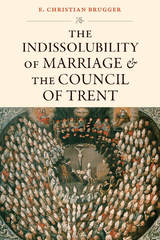
The Indissolubility of Marriage and the Council of Trent
E. Christian Brugger
Catholic University of America Press, 2017
This important volume examines the Catholic Church’s doctrine on the indissolubility of marriage as taught by the 16th century Ecumenical Council of Trent (1545-1563). In the Council’s reply to Reformation challenges on the sacraments, it took up the ques
[more]
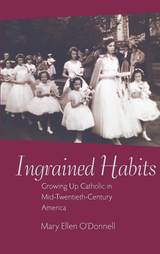
Ingrained Habits
Growing Up Catholic in Mid-Twentieth-Century America
Mary Ellen O'Donnell
Catholic University of America Press, 2018
Born Catholic. Raised Catholic. Americans across generations have used these phrases to describe their formative days, but the experience of growing up Catholic in the United States has changed over the last several decades. While the creed and the sacraments remain the same, the context for learning the faith has transformed. As a result of demographic shifts and theological developments, children face a different set of circumstances today from what they encountered during the mid-twentieth-century. Through a close study of autobiographical and fictional texts that depict the experience, Ingrained Habits explores the intimate details of everyday life for children growing up Catholic during the 1940s, 50s, and 60s. These literary portrayals present upbringings characterized by an all-encompassing encounter with religion. The adult authors of such writings run the gamut from vowed priests to unwavering atheists and their depictions range from glowing nostalgia to deep-seated resentment; however, they curiously describe similar experiences from their childhood days in the Church.
[more]
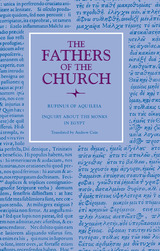
Inquiry about the Monks in Egypt
Rufinus of Aquileia
Catholic University of America Press, 2020
From September 394 to early January 395, seven monks from Rufinus of Aquileia’s monastery on the Mount of Olives made a pilgrimage to Egypt to visit locally renowned monks and monastic communities. Shortly after their return to Jerusalem, one of the party, whose identity remains a mystery, wrote an engaging account of this trip. Although he cast it in the form of a first-person travelogue, it reads more like a book of miracles that depicts the great fourth-century Egyptian monks as prophets and apostles similar to those in the Bible. This work was composed in Greek, yet it is best known today as Historia monachorum in Aegypto (Inquiry about the Monks in Egypt), the title of the Latin translation of this work made by Rufinus, the pilgrim-monks’ abbot.
The Historia monachorum is one of the most fascinating, fantastical, and enigmatic pieces of literature to survive from the patristic period. In both its Greek original and Rufinus’s Latin translation it was one of the most popular and widely disseminated works of monastic hagiography during Late Antiquity and the Middle Ages. Modern scholars value it not only for its intrinsic literary merits but also for its status, alongside Athanasius’s Life of Antony, the Pachomian dossier, and other texts of this ilk, as one of the most important primary sources for monasticism in fourth-century Egypt.
Rufinus’s Historia monachorum is presented here in English translation in its entirety. The introduction and annotations situate the work in its literary, historical, religious, and theological contexts.
[more]
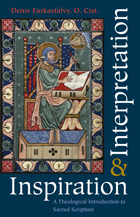
Inspiration and Interpretation
A Theological Introduction to Sacred Scripture
Denis Farkasfalvy
Catholic University of America Press, 2010
Inspiration and Interpretation provides readers with a much needed general theological introduction to the study of Sacred Scripture.
[more]
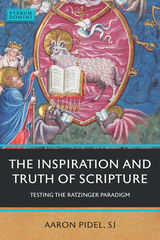
The Inspiration and Truth of Scripture
Testing the Ratzinger Paradigm
Aaron Pidel, SJ
Catholic University of America Press, 2023
What does it mean to say that Scripture is God’s Word? And just how true is the Bible? Though sometimes dismissed as “fundamentalist” concerns, these questions also sent twentieth-century Catholic theology searching for a new paradigm of biblical inspiration. Theologians repeatedly attempted to reconcile the traditional conviction that the Bible shares in the omniscience of its divine author with scholarly findings that suggested otherwise. Joseph Ratzinger contributed both negatively and positively to this project, deconstructing the regnant manualist models of inspiration and constructing an alternative inspired by St. Bonaventure. The result is an ecclesial model of surprising comprehensiveness and balance. Indeed, The Inspiration and Truth of Scripture concludes that Ratzinger’s alternative provides the least inadequate paradigm currently on offer today.
The Inspiration and Truth of Scripture breaks new ground in several ways. First, it situates Ratzinger within a broader Catholic quest for a theology of inspiration, showing his model offers advantages even relative to those proposed by modern theology’s most eminent minds: John Henry Newman, Pierre Benoit, Karl Rahner, and David Tracy. Secondly, this book shows how Ratzinger’s paradigm generates “tests” for identifying the perennially valid affirmations of Scripture, and thus an approach to resolving disputed biblical questions. Must one who accepts the authority of Scripture believe in the Devil? Are the Marian dogmas really “in” Scripture? To what extent does Jesus’s prohibition of divorce still apply in today’s changed social circumstances? Just how historical are Gospel narratives, like the Last Supper, intended to be? The result is a book that bridges the gap between normative theology and historical exegesis.
Overall, The Inspiration and Truth of Scripture presents Ratzinger not as an unimaginative enforcer of doctrinal conclusions but as a creatively faithful theologian, whose reconfiguration of inspiration should serve as the point of departure for all future reflection on the subject.
[more]
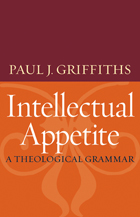
Intellectual Appetite
A Theological Grammar
Paul J. Griffiths
Catholic University of America Press, 2009
The appetite for knowledge--wanting to know things--is very strong in humans. Some will sacrifice all other goods (sex, power, food, life itself) for it. But this is not a simple appetite, and this book treats some of its complications, deformations, beauties, and intensities.
[more]
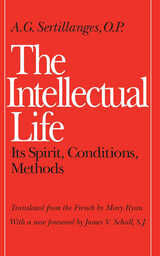
The Intellectual Life
A. G. Sertillanges
Catholic University of America Press, 1992
"Fr. Sertillanges's teachings are as timeless as any truths which describe the genuine nature of things. . . . This book is highly recommended not only for intellectuals, but also for students and those discerning their vocation in life."—New Oxford Review
"[This] is above all a practical book. It discusses with a wealth of illustration and insight such subjects as the organization of the intellectual worker's time, materials, and his life; the integration of knowledge and the relation of one's specialty to general knowledge; the choice and use of reading; the discipline of memory; the taking of notes, their classification and use; and the preparation and organization of the final production."—The Sign
[more]
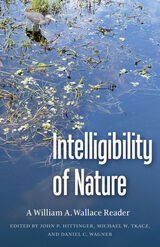
Intelligibility of Nature
A William A. Wallace Reader
William A. Wallace
Catholic University of America Press, 2022
The intelligibility of nature was a persistent theme of William A. Wallace, OP, one of the most prolific Catholic scholars of the late twentieth century. This Reader aims to make available a representative selection of his work in the history of science, natural philosophy, and theology illustrating his defense and development of this central theme. Wallace is among the most important Galileo scholars of the past fifty years and a key figure in the recent revival of scientific realism. Further, his long and productive scholarly career has been shaped by a continuous effort to bring the resources of the Aristotelian-Thomistic tradition to the solution of contemporary problems of philosophy and science. Through all of these contributions, Wallace has provided the foundation for a renewed confidence in the capacity of human knowers to attain understanding of the natural order. Consequently, the overall aim of this volume is to secure continued access to his scholarship for readers in the new millennium.
The Intelligibility of Nature will contain twenty-nine previously published essays written by Wallace over a period of some forty years. Many of these essays are currently not readily accessible. They are arranged in five thematic groups, each representing a major subject-area of Wallace's scholarly interests. The first group is devoted to essays on making nature intelligible through the use of scientific models. The second group of essays investigates various ways in which the Aristotelian-Thomistic tradition is foundational to contemporary scientific research. Essays in the third group are historical studies on the origins of modern science. The fourth group of essays discuss the viability of the cosmological argument for the existence of God in light of natural science. The final group of essays consider the relation of science and religion. Together these essays provide a representative sample of Wallace's multifaceted contributions to scholarship.
[more]
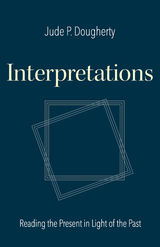
Interpretations
Reading the Present in Light of the Past
Jude P. Dougherty
Catholic University of America Press, 2018
Interpretations is a collection of essays produced by the distinguished philosopher Jude Dougherty over the past decade, written to inform or to provide commentary on contemporary issues. In probing the past to interpret the present they draw upon a perspective that one may call classical, the perspective of Plato, Aristotle, the Stoics, and their followers across the ages, notably Thomas Aquinas, and his modern disciples, such as Etienne Gilson and Jacques Maritain.
The first part of Interpretations is an attempt to understand modernity’s break with the past, the repudiation of Scholasticism and the classical tradition. Dougherty does this by referencing the dominant preoccupations of the Middle Ages, of the Renaissance, of the Reformation, of eighteenth-century British empiricism, and of nineteenth-century German philosophy, drawing upon the readings of Remi Brague, Pierre Manent, and others. What unifies these reflections is the role of religion (both in Christianity and Islam) in society and its impact on the culture, as well as looking at what is called “modernity” where this role becomes reduced or absent.
The second part of the volume examines selected addresses by Pope Emeritus Benedict XVI from a philosophical point of view. Benedict, like others through the course of history, has recognized the role of religion in producing cultural unity. These essays are an appreciation primarily of the subtlety of the former pontiff’s thought.
The third part of Interpretations collects essays and addresses on the practice and nature of philosophy that Dean Dougherty has given throughout his career at The Catholic University of America, and reflects the trajectory of his career and the development of his thought.
The first part of Interpretations is an attempt to understand modernity’s break with the past, the repudiation of Scholasticism and the classical tradition. Dougherty does this by referencing the dominant preoccupations of the Middle Ages, of the Renaissance, of the Reformation, of eighteenth-century British empiricism, and of nineteenth-century German philosophy, drawing upon the readings of Remi Brague, Pierre Manent, and others. What unifies these reflections is the role of religion (both in Christianity and Islam) in society and its impact on the culture, as well as looking at what is called “modernity” where this role becomes reduced or absent.
The second part of the volume examines selected addresses by Pope Emeritus Benedict XVI from a philosophical point of view. Benedict, like others through the course of history, has recognized the role of religion in producing cultural unity. These essays are an appreciation primarily of the subtlety of the former pontiff’s thought.
The third part of Interpretations collects essays and addresses on the practice and nature of philosophy that Dean Dougherty has given throughout his career at The Catholic University of America, and reflects the trajectory of his career and the development of his thought.
[more]
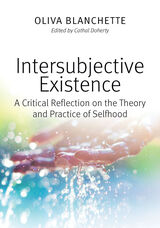
Intersubjective Existence
A Critical Reflection on the Theory and the Practice of Selfhood
Oliva Blanchette
Catholic University of America Press, 2021
Intersubjective Existence, as the author notes, aims, first, to develop a wisdom about human life that takes the form of a theory of selfhood and, second, to reflect on what is called for in the ethical practice of human existence. Secondly, the ethical implications of this theory of selfhood are
explored, specifically looking at conscience, prudential reasoning, justice, friendship, the law, temperance, courage, and concluding with a brief treatment of religion.
Olivia Blanchette charts the path of his inquiry through an analysis of reflective self-consciousness in selves communing with one another. They are constituted in their substance as a union of body and soul, with intelligence and free will that give rise to cultures in communion with other selves. These cultures are over and above what is given to each self in sense consciousness and in sense appetites and which each one contends with in the exercise of selfhood and the rights that go with that in keeping with justice. Concern for right reasoning and justice leads to an analysis of temperance and courage.
The chief arguments take the form of phenomenological reflections on the building blocks of the perennial philosophy. Blanchette recasts Aristotelian-Thomistic metaphysics from the perspective of a phenomenology of the mutual recognition of agents and the historical consciousness to which it gives rise.
[more]
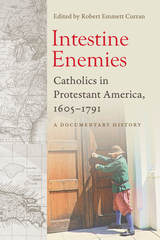
Intestine Enemies
Robert Emmett Curran
Catholic University of America Press, 2017
Intestine Enemies: Catholics in Protestant America, 1605-1791is a documentary survey of the experience of Roman Catholics in the British Atlantic world from Maryland to Barbados and Nova Scotia to Jamaica over the course of the two centuries that spanned colonization to independence. It covers the first faltering efforts of the British Catholic community to establish colonies in the late sixteenth and early seventeenth centuries; to their presence in the proprietary and royal colonies of the seventeenth century where policies of formal or practical toleration allowed Catholics some freedom for civic or religious participation; to their marginalization throughout the British Empire by the political revolution of 1688; to their transformation from aliens to citizens through their disproportionate contribution to the wars in the latter half of that century as a consequence of which half of the colonies of Britain’s American Empire gained their independence.The volume organizes representative documents from a wide array of public and private records – broadsides, newspapers, and legislative acts to correspondence, diaries, and reports – into topical chapters bridged by contextualized introductions. It affords students and readers in general the opportunity to have first-hand access to history. It serves also as a complement to Papist Devils: Catholics in British America, 1574-1783, a narrative history of the same topic.
[more]
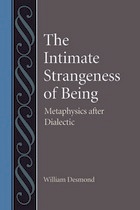
The Intimate Strangeness of Being
Metaphysics after Dialectic
William Desmond
Catholic University of America Press, 2012
This book explores the contested place of metaphysics since Kant and Hegel, arguing for a renewed metaphysical thinking about the intimate strangeness of being.
[more]
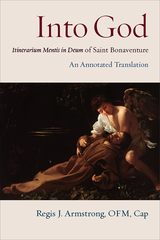
Into God
An Annotated Translation of Saint Bonaventure's Itinerarium Mentis in Deum
Cap. Regis J. Armstrong,OFM
Catholic University of America Press, 2020
An annotated translation of Bonaventure’s Itinerarium mentis in Deum presenting both the Latin text side-by-side with a new English translation which attempts to avoid the use of Latin cognates while remaining critically faithful to Bonaventure’s text. Using endnotes to open the text, Regis Armstrong opens each chapter from the perspective of historical theology referring the reader to authors prior to Bonaventure, e.g. Augustine, the Victorines, Philip the Chancellor, Avicenna, as well as first-and-second-generation Franciscan authors. While maintaining Bonaventure’s architectonic approach, Armstrong studies each chapter as Bonaventure does by focusing on its unique character, e.g. by means of cosmology, epistemology, biblical theology, mystical theology. In a same way, the translator attempts to explain his translation of certain cognates into Anglo-Saxon English by citing contemporary linguistic tools, e.g., Brepolis Latin Texts.
[more]
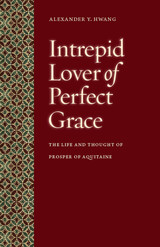
Intrepid Lover of Perfect Grace
The Life and Thought of Prosper of Aquitaine
Alexander Y. Hwang
Catholic University of America Press, 2009
Intrepid Lover of Perfect Grace provides students and scholars with the first biography of Prosper of Aquitaine (388-455) and the first book-length study in English of this important figure in the history of Christianity
[more]
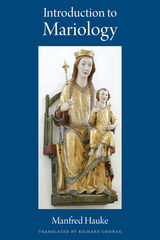
Introducation to Mariology
Manfred Hauke
Catholic University of America Press, 2020
In Introduction to Mariology, Fr. Manfred Hauke provides a synthesis of Mariology and the biblical fundaments and development of Marian doctrine. While it works as a comprehensive introduction suitable for courses on the subject, it is in reality a panoramic view on the entire Marian doctrine, and as such will be essential for the theological formation of seminarians, priests, theologians, and all kinds of educated Catholics. With an unparalleled bibliographic citation of Marian literature across a dozen languages, it is also a perfect gateway to further research on the subject.
It begins with Biblical doctrine, which is important especially for the dialogue with Protestant denominations: Catholic Mariology can be traced in its “embryonic” state already in Holy Scripture. From there Hauke presents a historical overview of the whole development of Marian doctrine, before developing further historical details in the subsequent chapters dedicated to systematic issues. The first systematic step approaches the figure of Mary through her role in the mystery of the Covenant between God and redeemed humanity; her being “Mother of God” and companion of the Redeemer is the “fundamental principle.” Then the four established Marian dogmas are presented: divine maternity, virginity, Immaculate Conception (in a chapter on Mary’s holiness more broadly), and bodily Assumption. A close look is given to maternal mediation which includes a part dedicated to the “Mater Unitatis”. A stand alone chapter is dedicated to Marian apparitions; authentic apparitions are presented as a part of prophetic charisma. The last chapter presents the basics on Marian devotion which culminates in the consecration to Mary (as a response to her maternal mediation).
Already available in Spanish, Italian, Portugese, and Korean, this landmark work is published here for the first time in English.
[more]
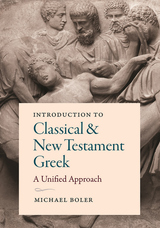
Introduction to Classical and New Testament Greek
A Unified Approach
Michael Boler
Catholic University of America Press, 2020
The defining feature of this textbook is the treatment of classical and New Testament Greek as one language using primary sources. All the example sentences the students will translate are real Greek sentences, half of which are taken from classical literature and philosophy and half of which are directly from the New Testament. The advantage of this approach is that it highlights the linguistic, literary, and historical connections between classical Greece and early Christianity. Rather than having students memorize isolated tables and artificial sentences, Michael Boler spent years combing through thousands of pages of literature, philosophy, and scripture to find short, powerful sentences that not only teach the grammatical concepts in each chapter, but also contain seeds of wisdom that will spark wonder and discussion.
Introduction to New Testament and Classical Greek is born out of classroom experience in a Catholic liberal arts university whose students were disappointed to be forced to choose between textbooks that taught classical Greek in isolation and ones that focused exclusively on the New Testament. By the end of this book, students will have read over 200 lines of scripture and an equal amount of ancient literature from Homer to Aristotle. They will also have the grammatical knowledge to continue to read classical and New Testament Greek. Each chapter contains a section at the end that delves deeply into the etymology and background of the words and passages encountered in the respective chapter. Professors will thus be able to use these chapters as a bridge to philosophical, theological, historical, and literary topics that will enrich the class.
[more]
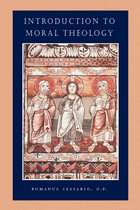
Introduction to Moral Theology (Catholic Moral Thought, Volume 1)
Romanus Cessario, O.P.
Catholic University of America Press, 2001
The present volume, the first in the new Catholic Moral Thought series, responds to the need for a new introduction to the basic and central elements of Catholic moral theology written in the light of Veritatis splendor.
[more]
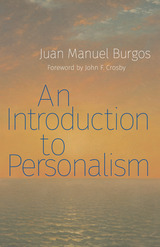
An Introduction to Personalism
Juan Manuel Burgos
Catholic University of America Press, 2018
Much has been written about the great personalist philosophers of the 20th century – including Jacques Maritain and Emmanuel Mournier, Martin Buber and Emmanuel Levinas, Dietrich von Hildebrand and Edith Stein, Max Scheler and Karol Wojtyla (later Pope John Paul II) – but few books cover the personalist movement as a whole. An Introduction to Personalism fills that gap.
Juan Manuel Burgos shows the reader how personalist philosophy was born in response to the tragedies of two World Wars, the Great Depression, and the totalitarian regimes of the 1930s. Through a revitalization of the concept of the person, an array of thinkers developed a philosophy both rooted in the best of the intellectual tradition and capable of dialoguing with contemporary concerns.
Burgos then delves into the potent ideas of more than twenty thinkers who have contributed to the growth of personalism, including Romano Guardini, Gabriel Marcel, Xavier Zubiri, and Michael Polanyi. Burgos’s encyclopedic knowledge of the movement allows for a concise and well-rounded perspective on each of the personalists studied.
An Introduction to Personalism concludes with a synthesis of personalist thought, bringing together the brightest insights of each personalist philosopher into an organic whole. Burgos argues that personalism is not an eclectic hodge-podge, but a full-fledged school of philosophy, and gives a dynamic and rigorous exposition of the key features of the personalist position.
Our times are marked by numerous and often contradictory ideas about the human person. An Introduction to Personalism presents an engaging anthropological vision capable of taking the lead in the debate about the meaning of human existence and of winning hearts and minds for the cause of the dignity of every person in the 21st century and beyond.
Juan Manuel Burgos shows the reader how personalist philosophy was born in response to the tragedies of two World Wars, the Great Depression, and the totalitarian regimes of the 1930s. Through a revitalization of the concept of the person, an array of thinkers developed a philosophy both rooted in the best of the intellectual tradition and capable of dialoguing with contemporary concerns.
Burgos then delves into the potent ideas of more than twenty thinkers who have contributed to the growth of personalism, including Romano Guardini, Gabriel Marcel, Xavier Zubiri, and Michael Polanyi. Burgos’s encyclopedic knowledge of the movement allows for a concise and well-rounded perspective on each of the personalists studied.
An Introduction to Personalism concludes with a synthesis of personalist thought, bringing together the brightest insights of each personalist philosopher into an organic whole. Burgos argues that personalism is not an eclectic hodge-podge, but a full-fledged school of philosophy, and gives a dynamic and rigorous exposition of the key features of the personalist position.
Our times are marked by numerous and often contradictory ideas about the human person. An Introduction to Personalism presents an engaging anthropological vision capable of taking the lead in the debate about the meaning of human existence and of winning hearts and minds for the cause of the dignity of every person in the 21st century and beyond.
[more]
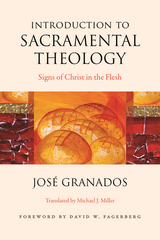
Introduction to Sacramental Theology
Signs of Christ in the Flesh
Jose Granados
Catholic University of America Press, 2021
Introduction to Sacramental Theology presents a complete overview of sacramental theology from the viewpoint of the body. This viewpoint is supported, in the first place, by Revelation, for which the sacraments are the place where we enter into contact with the body of the risen Jesus. It is a viewpoint, secondly, which is firmly rooted in our concrete human bodily experience, thus allowing for a strong connection between faith and life, creation and redemption.
From this point of view, the treatise on the sacraments occupies a strategic role. For the sacraments appear, not as the last of a series of topics (after dealing with Creation, Christ, the Church), but as the original place in which to stand in order to contemplate the entire Christian mystery. This point of view of the body, which resonates with contemporary philosophy, sheds fruitful light on classical themes, such as the relationship of the sacraments with creation, the composition of the sacramental sign, the efficacy of the sacraments, the sacramental character, the role of the minister, or the relationship of the sacrament with the Church as a sacrament.
As a result of this approach, the Eucharist takes on a central role, since this is the sacrament where the body of Jesus is made present. The rest of the sacraments are seen as prolongations of the eucharistic body, so as to fill all the time and space of the faithful. This foundation of the theology of the sacraments in eucharistic theology is supported by an analysis of the patristic and medieval tradition.
In order to support its conclusions, Introduction to Sacramental Theology examines the doctrine of Scripture (especially St. John and St. Paul), the main patristic and medieval authors (St. Augustine, Hugh of St. Victor, St. Bonaventure, St. Thomas Aquinas), the response of Trent to the protestant challenges, up to modern authors such as Scheeben, Rahner, Ratzinger, or Chauvet, including the teaching of Vatican II about the Church as a kind of sacrament.
[more]
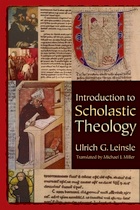
Introduction to Scholastic Theology
Ulrich G. Leinsle
Catholic University of America Press, 2010
With this book, distinguished historian of philosophy Ulrich Leinsle offers the first comprehensive introduction to scholastic theology -- a textbook for both Protestant and Catholic students.
[more]
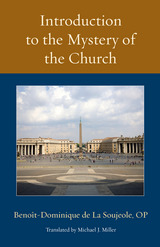
Introduction to the Mystery of the Church
Benoit-Dominique de La Soujeole, OP
Catholic University of America Press, 2014
An ecclesiological survey presenting a doctrinal synthesis of the church.
[more]
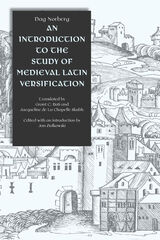
An Introduction to the Study of Medieval Latin Versification
Dag Norberg
Catholic University of America Press, 2004
Dag Norberg's analysis and interpretation of Medieval Latin versification, which was published in French in 1958 and remains the standard work on the subject, appears here for the first time in English with a detailed, scholarly introduction by Jan Ziolkowski that reviews the developments of the past fifty years.
[more]
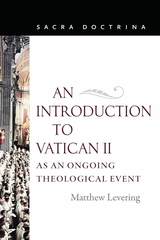
An Introduction to Vatican II as an Ongoing Theological Event
Matthew Levering
Catholic University of America Press, 2017
Contemporary scholars often refer to “the event of Vatican II,” but what kind of an event was it? In this first book of the new CUA Press series Sacra Doctrina, Matthew Levering leads his readers to see the Council as a “theological event”—a period of confirming and continuing God’s self-revelation in Christ into a new historical era for the Church.
This is an introduction to Vatican II with a detailed summary of each of its four central documents—the dogmatic constitutions—followed by explanations of how to interpret them. In contrast to other introductions, which pay little attention to the theological soil in which the documents of Vatican II germinated, Levering offers a reading of each conciliar Constitution in light of a key theological author from the era: René Latourelle, SJ for Dei Verbum (persons and propositions); Louis Bouyer, CO for Sacrosanctum Concilium (active participation); Yves Congar, OP for Lumen Gentium (true and false reform); and Henri de Lubac, SJ for Gaudium et Spes (nature and grace).
This theological event is “ongoing,” Levering demonstrates, by tracing in each chapter the theological debates that have stretched from the close of the council till the present, and the difficulties the Church continues to encounter in encouraging an ever deeper participation in Jesus Christ on the part of all believers. In this light, the book’s final chapter compares the historicist (Massimo Faggioli) and Christological (Robert Imbelli) interpretations of Vatican II, arguing that historicism can undermine the Council’s fundamental desire for a reform and renewal rooted in Christ. The conclusion addresses the concerns about secularization and loss of faith raised after the Council by Henri de Lubac, Joseph Ratzinger, and Yves Congar, arguing that contemporary Vatican II scholarship needs to take these concerns more seriously.
This is an introduction to Vatican II with a detailed summary of each of its four central documents—the dogmatic constitutions—followed by explanations of how to interpret them. In contrast to other introductions, which pay little attention to the theological soil in which the documents of Vatican II germinated, Levering offers a reading of each conciliar Constitution in light of a key theological author from the era: René Latourelle, SJ for Dei Verbum (persons and propositions); Louis Bouyer, CO for Sacrosanctum Concilium (active participation); Yves Congar, OP for Lumen Gentium (true and false reform); and Henri de Lubac, SJ for Gaudium et Spes (nature and grace).
This theological event is “ongoing,” Levering demonstrates, by tracing in each chapter the theological debates that have stretched from the close of the council till the present, and the difficulties the Church continues to encounter in encouraging an ever deeper participation in Jesus Christ on the part of all believers. In this light, the book’s final chapter compares the historicist (Massimo Faggioli) and Christological (Robert Imbelli) interpretations of Vatican II, arguing that historicism can undermine the Council’s fundamental desire for a reform and renewal rooted in Christ. The conclusion addresses the concerns about secularization and loss of faith raised after the Council by Henri de Lubac, Joseph Ratzinger, and Yves Congar, arguing that contemporary Vatican II scholarship needs to take these concerns more seriously.
[more]
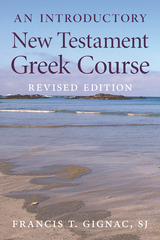
An Introductory New Testament Greek Course, Revised Edition
Francis T. Gignac, SJ
Catholic University of America Press, 2015
Many Christians have the desire to read the New Testament in its original language. Unfortunately, books that introduce the student to New Testament Greek either tend to be long-winded, or overly simplified, or both. In this book, legendary scholar of biblical Greek, the late Frank Gignac provides a straight-forward "just the facts" approach to the subject. In fifteen lessons, he presents the basics of the grammar and the vocabulary essential for reading the Gospels in the original language. All the reader need do is to supply the desire to learn. As Gignac writes, "good luck as you begin to learn another language! It may be sheer drudgery for a while, but the thrill will come when you begin to read the New Testament in the language in which it was written."
[more]
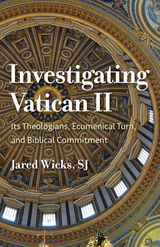
Investigating Vatican II
Its Theologians, Ecumenical Turn, and Biblical Commitment
Jared Wicks
Catholic University of America Press, 2018
Investigating Vatican II is a collection of Fr. Jared Wicks’ recent articles on Vatican II, and presents the Second Vatican Council as an event to which theologians contributed in major ways and from which Catholic theology can gain enormous insigh
[more]
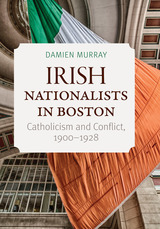
Irish Nationalists in Boston
Catholicism and Conflict, 1900-1928
Damien Murray
Catholic University of America Press, 2018
During the first quarter of the twentieth century, the intersection of support for Irish freedom and the principles of Catholic social justice transformed Irish ethnicity in Boston. Prior to World War I, Boston’s middle-class Irish nationalist leaders sought a rapprochement with local Yankees. However, the combined impact of the Easter 1916 Rising and the postwar campaign to free Ireland from British rule drove a wedge between leaders of the city’s two main groups. Irish-American nationalists, emboldened by the visits of Irish leader Eamon de Valera, rejected both Yankees’ support of a postwar Anglo-American alliance and the latter groups’ portrayal of Irish nationalism as a form of Bolshevism. Instead, ably assisted by Catholic Church leaders such as Cardinal William O’Connell, Boston’s Irish nationalists portrayed an independent Ireland as the greatest bulwark against the spread of socialism. As the movement’s popularity spread locally, it attracted the support not only of Irish immigrants, but also that of native-born Americans of Irish descent, including businessman, left-leaning progressives, and veterans of the women’s suffrage movement.
For a brief period after World War I, Irish-American nationalism in Boston became a vehicle for the promotion of wider democratic reform. Though the movement was unable to survive the disagreements surrounding the Anglo-Irish Treaty of 1921, it had been a source of ethnic unity that enabled Boston’s Irish community to negotiate the challenges of the postwar years including the anti-socialist Red Scare and the divisions caused by the Boston Police Strike in the fall of 1919. Furthermore, Boston’s Irish nationalists drew heavily on Catholic Church teachings such that Irish ethnicity came to be more clearly identified with the advocacy of both cultural pluralism and the rights of immigrant and working families in Boston and America.
For a brief period after World War I, Irish-American nationalism in Boston became a vehicle for the promotion of wider democratic reform. Though the movement was unable to survive the disagreements surrounding the Anglo-Irish Treaty of 1921, it had been a source of ethnic unity that enabled Boston’s Irish community to negotiate the challenges of the postwar years including the anti-socialist Red Scare and the divisions caused by the Boston Police Strike in the fall of 1919. Furthermore, Boston’s Irish nationalists drew heavily on Catholic Church teachings such that Irish ethnicity came to be more clearly identified with the advocacy of both cultural pluralism and the rights of immigrant and working families in Boston and America.
[more]
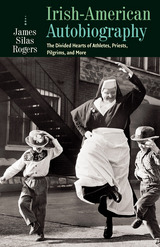
Irish-American Autobiography
James Silas Rogers
Catholic University of America Press, 2016
Irish-American Autobiography opens a new window on the shifting meanings of Irishness over the twentieth century, by looking at a range of works that have never before been considered as a distinct body of literature. Opening with celebrity memoirs from athletes like boxer John L. Sullivan and ballplayer Connie Mack - written when the Irish were eager to put their raffish origins behind them - later chapters trace the many tensions, often unspoken, registered by Irish Americans who've told their life stories. New York saloonkeepers and South Boston step dancers set themselves against the larger culture, setting a pattern of being on the outside looking in. Even the classic 1950s TV comedy The Honeymooners speaks to the urban Irish origins, and the poignant sense of exclusion felt by its creator Jackie Gleason. Catholicism, so key to the identity of earlier generations of Irish Americans, has also evolved. One chapter looks at the painful diffidence of priest autobiographers, and others reveal how traditional Irish Catholic ideas of the guardian angel and pilgrimage have evolved and stayed potent down to our own time. Irish-American Autobiography becomes, in the end, a story of a continued search for connection - documenting an "ethnic fade" that never quite happened.
[more]
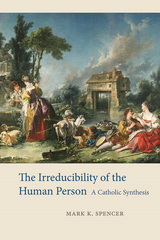
The Irreducibility of the Human Person
A Catholic Synthesis
Mark K. Spencer
Catholic University of America Press, 2022
Catholic philosophical anthropologists have defended views of the human person on which we are irreducible to anything non-personal. For example, it is not the case that we are nothing but matter, souls, or parts of society. But many Catholic anthropologies have overlooked ways in which we are irreducible and so have not given an adequate account of the uniqueness of each human person. This book presents a philosophical portrait of human persons that depicts each way in which we are irreducible, with the goal of guiding the reader to perceive, wonder at, and love all the unique features of human persons. It builds this portrait by showing how claims from many strands of the Catholic tradition can be synthesized. These strands include Thomism, Scotism, phenomenology, personalism, nouvelle théologie, analytic philosophy, and Greek and Russian thought. The book focuses on how these traditions’ claims are grounded in experience and on how they help us to perceive irreducible features of persons. While many metaphysical claims about persons are defended, the picture of persons that ultimately emerges is one on which persons are best grasped not through abstract concepts but through aesthetic perception and love, as unique kinds of beauty.
This book also explores irreducible features of our subjectivity, senses, intellect, freedom, and affections, and of our souls, bodies, and activities. It includes discussions of divine simplicity and causality, and of the nature of angels, matter, organisms, and artifacts, all of which must be understood to fully grasp our irreducibility. In showing how to synthesize various traditions’ claims, the book also offers new solutions to a number of debates in Catholic philosophy. These include debates over natural law, the natural desire to see God, the separated soul, integralism and personalism, idealist and realist phenomenology, and scholastic accounts of the act of existence.
[more]
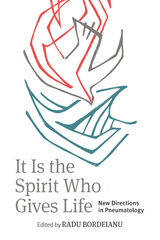
It is the Spirit Who Gives Life
New Directions in Pneumatology
Radu Bordeianu
Catholic University of America Press, 2022
Who is the Holy Spirit? What is the Holy Spirit? The answers to these questions were so obvious in the first centuries of Christian history, that the New Testament and the earliest Christian writers did not feel the need to deliberately address the identity of the Spirit. The more stringent question was this: what does the Spirit do in the Hebrew Scriptures, in the life of Jesus, in the community of disciples, in the Church, and in the world? These same questions, however, did not have the same obvious answers to subsequent generations.
Writing in the fourth century, Gregory of Nazianzus observed a slow progress of better understanding the identity and mission of the Holy Spirit throughout the centuries; his opponents still referred to the Spirit as a “strange,” “unscriptural,” and “interpolated” God (Or. 31). One would expect that today, centuries later, pneumatology would be exponentially further developed than in the patristic era. And yet, contemporary theology only rarely asks who the Spirit is and what the Spirit does. That is where the present volume attempts to bring a contribution, by addressing early Pneumatologies reflected in the Scriptures and the age of the martyrs, historical developments in patristic literature and spiritual writings, and contemporary pneumatological themes, as they relate to ecumenism, ecology, science, ecclesiology, and missions.
The present volume gathers essays authored by eleven world-renowned theologians. Each contribution originated as a public lecture addressed to theologians and an educated general audience, followed by a private colloquium in which the lecturers conferred with scholars who are experts in the field. Thus, the present volume offers a multifaceted approach to Pneumatology, in an ecumenical spirit.
[more]
READERS
Browse our collection.
PUBLISHERS
See BiblioVault's publisher services.
STUDENT SERVICES
Files for college accessibility offices.
UChicago Accessibility Resources
home | accessibility | search | about | contact us
BiblioVault ® 2001 - 2024
The University of Chicago Press









